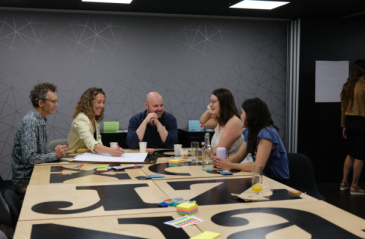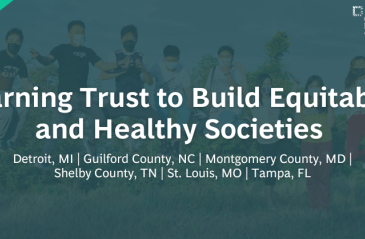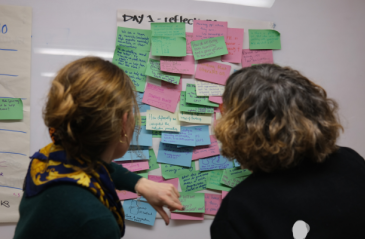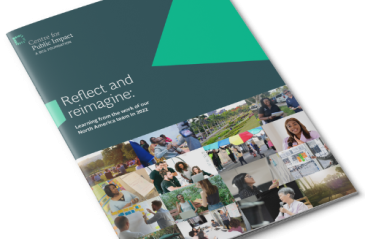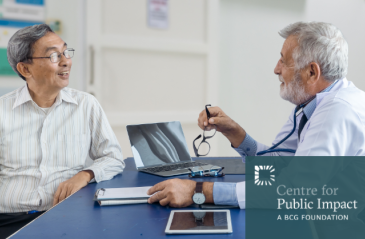
Latrobe Health Advocate: Fostering equitable and healthy societies through international collaboration

@Seed_Global trains the next generation of health professionals in five countries across Africa.
Share article@Seed_Global has trained more than 8,300 doctors, nurses and midwives
Share article@Seed_Global founder @VBKerry is now looking to craft a new partnership with @DFID
Share articleWe put our vision for government into practice through learning partner projects that align with our values and help reimagine government so that it works for everyone.
In 1991 Vanessa Kerry went on a trip with her dad. Their destination? Vietnam. At 14 years old she was already something of a seasoned traveller - the result of growing up in a family of public service - but this was a journey that was to have lifelong implications.
"I'd always known I wanted to be a doctor," she recalls, "but this was a time when US sanctions were still in place and I witnessed poverty that I'd never truly witnessed before. I'd had the privilege of travelling in the US and understanding the rich diversity we have here, but as I went on to Medical School I kept being haunted by what I'd seen. I realised that in some way I wanted to bring together my experience in medicine with trying to address some of the big challenges to health globally."
Kerry was as good as her word. Today, while she continues her practice, including a recent rotation at Massachusetts General Hospital, Dr Kerry has focused on her role as founder and chief executive of Seed Global Health, a Boston-based non-profit which trains the next generation of local doctors, nurses, and other health workers in five countries across Africa.
Although it is relatively young - Seed started up operations only a few years ago - it can already point to some notable successes, including training more than 8,300 doctors, nurses and midwives and teaching more than 450 new skills and competencies. Kerry, though, is eager for more.
"We are in five countries - Malawi, Tanzania, Uganda, Liberia and Swaziland - but there are 83 countries around the world which have critical shortages of trained health staff," she points out. "The shortage is currently 7.2 million and it's expected to grow to 18 million over the next 20 years. It's not getting smaller unless we decide to do something about it." Which is where Seed comes in.
Seed's flagship programme is a public-private partnership. Although about one third of the partnership's funding comes from the federal government, the rest is provided by its philanthropic partners - individuals, corporations and foundations. The core programme, which Seed runs with the US Peace Corps, places US health professionals alongside local medical and nursing faculty counterparts to meet the teaching needs identified at each partner institution. Since its launch it has grown exponentially, with 30 volunteers in the first year and 71 currently on deployment across its five countries. Kerry is determined, however, that their impact lasts long after their return to the US.
"After residency training I did some work in Rwanda, Uganda and Ghana," she explains. "I saw people fly in and fly out but never leave a lasting legacy behind. They never really transferred skills, and they were never actually investing in the places where they were working in a way that was sustainable. This didn't make sense - there was a bunch of people who wanted to help, but we needed to fundamentally change what needed to be done. What our programme is about is teaching and training the next generation of local health leaders, because they are the ones who know what the problems are and know what the solutions are - they just need the support and opportunity to implement them."
Kerry goes on to say that what underpins much of Seed's approach to impact is the recognition that leadership - particularly local leadership - is critical to achieving the long-term transformations they seek. "Fewer people live in poverty today than 10 years ago, but the issue now is to keep the momentum going in a way that is lasting and country-owned, and this is where we are unique and different," she says. "We're one of the few organisations that has really focused on medical and nursing education, training and capacity-building, because fundamentally it's about leadership. Investing in community health workers and skilled birth attendants is important in improving access, but well-trained health professionals are needed for countries to sustainably improve health outcomes and lead on their own solutions. And this is what drives our work."
So what, in Kerry's view, is an effective leader? She says that a leader needs to combine a number of different traits and approaches. "For me personally, a leader is someone who is a convenor and capable of listening, who is humble enough to admit when they are wrong," she says. "But at the same time they need to have a vision of what is possible and be willing to make difficult decisions to move forward. For us, this means we want doctors and nurses to be well armed with evidence and information and clinical experience. So they understand how to apply what they learned in the classroom to the wards but also see the patterns, so they can develop a policy which helps all patients. It's not about the leader, it's about the impact they have."
The arrival of a new Administration will inevitably herald a shift in foreign policy, but Kerry remains hopeful that the programme's use of funds from US President's Emergency Plan for AIDS Relief (PEPFAR) - something which enjoys bipartisan support - should provide continued assistance going forward. "With any Administration change, there is always going to be a level of uncertainty," she concedes. "But I believe the work we are doing at Seed transcends politics and aligns with a government's interests in developing public-private partnerships that improve health and economic security in the world.”
Certainly, there appear to be no plans to slow down any time soon. Among a wide array of future plans and objectives, Kerry pinpoints her wish to partner up with the UK's Department for International Development (DFID) as a key priority. "We are at an exciting moment," she says. "If you look at the history of what the UK has done in global health, there has been massive investment in education and training, including a programme where NHS staff have trained over 25,000 health workers in Africa and Asia. We would love to craft a partnership with DFID to help expand the impact and harness this global commitment that is so intrinsic to the UK."
To make rapid progress, however, sometimes it is necessary to take a look back and consider where an organisation has come from. Kerry, when asked what advice she would give her younger self the day before Seed became operational, says that there are always opportunities to learn.
"Every day is a lesson," she points out. "I think it is really important to be surrounded by people who share your vision and who aren't necessarily aligned about how you implement, because it is important to have diverse opinions. You want people who can understand the complexity of a problem and who can course-correct if it's not going well. It's also really important to invest in talent early - bring the right people on board who know what they're doing. When you start a non-profit it sometimes takes a while to figure out the human resource mix on your team. But I'm so proud to have an unbelievable team working here."
Another person who no doubt shares these feelings of pride is her dad, former secretary of state John Kerry. Little did he know that their trip to Vietnam - a country which helped shaped his own life, career and global outlook - would also have such a profound impact on his daughter, helping spawn her own thirst for public service. It's a thirst which shows no signs of being quenched any time soon. Quite the opposite actually...




